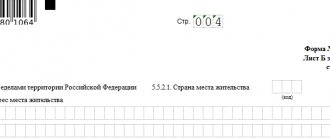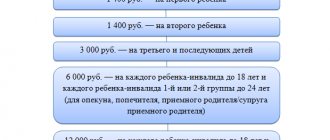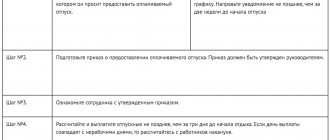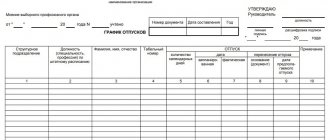The right to leave arises for an employee after six months of continuous work with a particular employer.
Article 122 of the Labor Code of the Russian Federation stipulates the right to grant an employee leave even before the expiration of this period. In addition, this article also establishes a list of categories of employees who should be granted leave upon their application and before the expiration of this period. Labor Code of the Russian Federation
dated December 30, 2001 N 197-FZ
Full text of the article, guides, additional information - in ConsultantPlus
These workers include:
- pregnant employees - they are granted annual leave immediately before or after maternity leave;
- minor workers;
- employees who are adoptive parents of children under 3 months of age;
- husbands of pregnant workers while they are on maternity leave (Article 123 of the Labor Code of the Russian Federation);
- as well as other categories of employees whose right to leave on demand is stipulated by federal regulations.
Leave for part-time workers is granted at the main place and at the part-time place of work simultaneously (Article 286 of the Labor Code of the Russian Federation). Moreover, if at the time of going on leave at the main place of work, the part-time worker has not yet acquired the right to leave at the place of part-time work (worked there for less than 6 months), then leave for the year is granted to him at this place of work in advance, in full, and is fully paid .
Providing leave in advance is also possible in other cases stipulated by the local regulations of a particular employer.
Duration of vacation
The duration of the main annual leave granted to an employee cannot be less than 28 calendar days. This period does not include holidays.
The minimum duration of annual leave does not depend on the working hours established for the employee (normal, part-time or reduced). We note, however, that for certain employees the Labor Code and federal legislation establishes a special, extended annual leave. So:
- the duration of the minimum vacation for minor workers is 31 days;
- annual leave for disabled employees cannot last less than 30 days;
- the minimum duration of leave for employees of child care institutions is 43 days;
- employees of educational institutions and teachers have the right to annual leave with a minimum duration of 42 to 56 days;
- Investigators of the prosecutor's office and prosecutors are guaranteed annual leave of at least 30 days.
In all the above cases, the duration of leave is indicated in calendar days.
Rights of certain categories of workers
Drawing up a vacation schedule should take into account the right of certain categories of employees to use vacation at a certain time. It arises on the basis of the provisions of the Code itself and individual Federal Laws.
Thus, employees whose wives are on maternity leave can go on leave at any time convenient for them based on the provisions of Part 4 of Art. 123 of the Labor Code of the Russian Federation, and on the basis of Art. 11 of the Law “On the Status of Military Personnel”, military spouses have the same right.
There are 14 special categories of workers.
Of course, in combination with various types of business needs, it is very difficult to create a vacation schedule that respects the interests of all employees and takes into account the rights of all special categories. Especially in the regions of the Far North and equivalent areas, where in certain cases working parents of minors and persons equal to them in terms of rights have the right to receive annual paid leave out of turn.
Parents in these regions can even receive regular leave to accompany a child under 18 years of age entering an educational institution.
Providing leave
The employee must be granted leave before the end of the current working year. If there are reasons why leave cannot be granted within the period specified in the leave schedule, then a new leave date must be determined by agreement with the employee.
Refusal to grant leave for two consecutive years is prohibited.
If the employment contract with the employee was concluded for a period of less than 2 months, then instead of leave upon dismissal, compensation may be provided. Its size is calculated as follows: two working days for one month of work.
Procedure for drawing up vacation regulations
The presence in the Labor Code of strictly prescribed postulates applied to resolving a particular issue does not mean that they cannot be duplicated in the provision on granting vacations. The main task when drawing up a document is to ensure that the rules specified in it do not violate the rights of the company’s employees. This follows from the provisions of Article 8 of the Labor Code on the basis that the document in question refers to local legal acts, which in turn lose their relevance if the norms prescribed in them, in comparison with the norms of labor legislation, put workers in a worse position. As for the rest, the drafting of the leave regulations and exactly what items will be spelled out in it remains entirely at the discretion of the employer. There is no strictly regulated form of the document in this case.
Typically, a vacation provision, when it is drawn up in a specific company, is issued for an indefinite period. If it is necessary to make changes to it, the corresponding order of the director is issued, and the current version of the document is updated. When hiring a new employee, as a rule, they are provided with this document for review and signature.
Splitting and transferring leave
It is possible to grant leave in parts. The division of vacation is carried out by agreement between the employee and the employer, and at least one of the parts of the vacation must last at least 14 calendar days (Article 125 of the Labor Code of the Russian Federation).
Also, by agreement between the parties to the employment contract, vacation may be postponed in cases where:
- the employee was not notified of the start of vacation two weeks before it began;
- The employee was not paid vacation pay on time.
Why do you need a position?
The grounds, procedure and conditions for providing legal days off to employees are contained in the Labor Code. It does not require the employer to have a leave provision. But the adoption of such a document will be extremely useful both for employees and for the employer himself: it can cover in detail certain issues of granting leave that are not regulated by current legislation and are left to the discretion of the parties. For example:
- rules for granting administrative leave to employees. You can specify the conditions under which the employee can count on it;
- issues regarding the provision of additional rest, the rules of which are not established at the legislative level, but are left to the agreement of the parties;
- nuances of granting study leave to employees;
- questions about combining or using parts of vacations, as well as the procedure for paying for such time;
- a list of necessary documents that an employee must provide when applying for a particular type of vacation, etc.
In addition, the vacation provision may contain answers to questions regarding vacation payments.
When drawing up a document, you should remember that its norms should not worsen the conditions for providing rest existing in labor legislation (according to Article 8 of the Labor Code of the Russian Federation). For example, when setting the duration of leave for work in hazardous conditions, an employer can provide employees with ten days instead of seven. But no less than what is provided for in Art. 117 Labor Code of the Russian Federation.
Vacation pay
No later than three days before the start of the vacation, the employee must be paid vacation pay. The amount of vacation pay is subject to personal income tax, unified social tax, contributions to compulsory pension insurance and insurance against accidents and occupational diseases in the general manner. The procedure for calculating vacation pay is stipulated in Article 139 of the Labor Code of the Russian Federation.
If the leave was granted to the employee in advance and the employee was dismissed before the end of the year for which he received this leave, then the leave pay paid to this employee is withheld from his salary.
No deduction is made if the employee:
- dismissed due to refusal to transfer for health reasons (based on a medical report) or due to the fact that the employer does not have the opportunity to provide such an employee with a place that meets the requirements specified by the medical report;
- dismissed due to staff reduction or liquidation of an organization or individual entrepreneur;
- is a manager, his deputy or chief accountant who was dismissed due to a change in the ownership of the organization’s property;
- dismissed due to conscription for military service or sent to alternative civilian service;
- was dismissed earlier and reinstated by decision of the State Tax Inspectorate or the court;
- is recognized as completely incapacitated based on a medical report;
- died or was declared dead or missing by the court;
- dismissed due to the death of the employer, as well as due to the court recognizing the employer as deceased or missing;
- cannot continue to work due to emergency circumstances.
Making a vacation schedule
The law does not establish rules on how an employer should collect the vacation dates they want from employees. Usually, all employees of a workshop or department are given a list of them, and opposite each name they themselves indicate the dates they want. If the collective agreement contains a provision that the leave is divided into two parts, then there are two stages.
Then the head of the department transmits the result to his immediate superior. Some institutions issue separate orders establishing regulations.
To draw up the schedule itself, the unified form T-7 is usually used, which was approved by the State Statistics Committee of the Russian Federation back in 2004. The law does not regulate how the schedule should be approved. In some enterprises, an executive visa is used for this, while in others an order is also issued.
All this makes the vacation schedule a mandatory document, which can be treated rather arbitrarily.
The controversial nature of the vacation schedule is confirmed by the fact that proposals to cancel it began to be voiced simultaneously with the proposal to cancel work books. However, the latter were transferred to electronic format, but they decided not to change the vacation schedules for now. Let us remind you that workers in the Russian Federation regularly recall their vacations, and some do not use them for several years.
Extending or postponing vacation
Art. 124 of the Labor Code of the Russian Federation introduces grounds for extending or postponing annual paid leave:
| Extension | Transfer |
Both options are possible if, during vacation, the employee:
| |
| — | Performed at the request of the employee if the employer violated the deadline for paying vacation pay or notifying the employee about the start of vacation |
| — | Done for the next working year with the consent of the employee, the absence of which will adversely affect the normal course of work of the employer |
In both cases, vacation pay is recalculated if necessary.
Additional materials on extending and postponing vacations:
- How to extend vacation if an employee is sick;
- Is it necessary to apply for an extension of leave due to sick leave;
- Extension of leave when caring for a sick family member;
- Order to postpone vacation;
- Transfer of vacation at the request of the employee;
- Transfer of vacation at the initiative of the employer;
- What to do if employees go on vacation at the same time;
- Application for transfer of vacation.
When to write an order
The vacation schedule is drawn up in advance - no later than two weeks before the start of the year by which vacation time is distributed. At the same time, in the process of creating a schedule, both the wishes of employees and production needs should be taken into account.
The preliminary schedule must be submitted for approval to the trade union body (if there is one at the enterprise), then all employees of the organization must be familiarized with the order against signature (if this is not done, disputes and disagreements with employees may well arise, leading to litigation proceedings).
The vacation schedule is a binding document; any adjustments can be made to it only with the mutual consent of the employee and the employer, provided that this in no way affects the functioning of the company and does not affect the interests of other employees. Changes may also be made when hiring new employees and due to forced and force majeure circumstances.
It should be noted that all types of vacations are included in the schedule:
- planned,
- additional,
- "last year's"
- as well as vacations issued to “part-time workers.”
Also, when compiling it, you should first of all take into account the opinion of the “beneficiaries”, i.e. those employees who, by law, can choose their own vacation time, without taking into account the wishes of the employer and those who belong to “special” categories:
- minors,
- disabled people
- employees with irregular working hours (in these cases, the duration of leave is non-standard).




